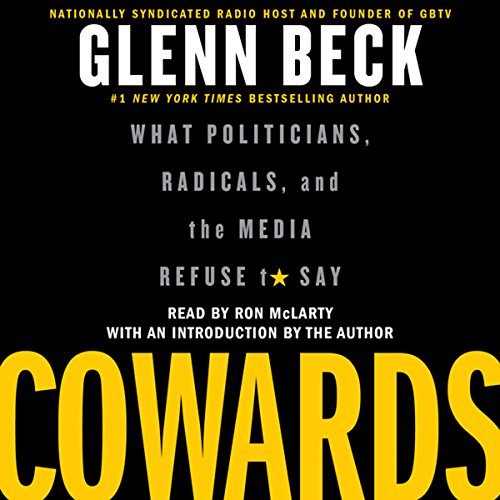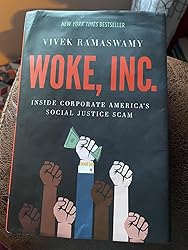
 Audible sample
Audible sample  Playing...
Playing... 
 Paused
Paused  Your audiobook is waiting!
Your audiobook is waiting!
Enjoy a free trial on us
$0.00$0.00
- Click above for unlimited listening to select audiobooks, Audible Originals, and podcasts.
- One credit a month to pick any title from our entire premium selection — yours to keep (you'll use your first credit now).
- You will get an email reminder before your trial ends.
- $14.95$14.95 a month after 30 days. Cancel online anytime.
Buy
-13% $19.10$19.10
Woke, Inc.: Inside Corporate America's Social Justice Scam
 Audible Audiobook
– Unabridged
Audible Audiobook
– Unabridged
An Instant New York Times Best Seller
A young entrepreneur makes the case that politics has no place in business and sets out a new vision for the future of American capitalism.
There’s a new invisible force at work in our economic and cultural lives. It affects every advertisement we see and every product we buy, from our morning coffee to a new pair of shoes. “Stakeholder capitalism” makes rosy promises of a better, more diverse, environmentally friendly world, but in reality, this ideology, championed by America’s business and political leaders, robs us of our money, our voice, and our identity.
Vivek Ramaswamy is a traitor to his class. He’s founded multibillion-dollar enterprises, led a biotech company as CEO; he became a hedge fund partner in his 20s, trained as a scientist at Harvard and a lawyer at Yale, and grew up the child of immigrants in a small town in Ohio. Now he takes us behind the scenes into corporate boardrooms and five-star conferences, into Ivy League classrooms and secretive nonprofits, to reveal the defining scam of our century.
The modern woke-industrial complex divides us as a people. By mixing morality with consumerism, America’s elites prey on our innermost insecurities about who we really are. They sell us cheap social causes and skin-deep identities to satisfy our hunger for a cause and our search for meaning, at a moment when we as Americans lack both.
This book not only rips back the curtain on the new corporatist agenda, it offers a better way forward. America’s elites may want to sort us into demographic boxes, but we don’t have to stay there. Woke, Inc. begins as a critique of stakeholder capitalism and ends with an exploration of what it means to be an American in 2021 - a journey that begins with cynicism and ends with hope.
- Listening Length10 hours and 27 minutes
- Audible release dateAugust 17, 2021
- LanguageEnglish
- ASINB098GHHTB3
- VersionUnabridged
- Program TypeAudiobook
 Read & Listen
Read & Listen
Get the Audible audiobook for the reduced price of $12.99 after you buy the Kindle book.
People who viewed this also viewed
- Audible Audiobook
- Audible Audiobook
- Audible Audiobook
- Audible Audiobook
- Audible Audiobook
People who bought this also bought
- Audible Audiobook
- Audible Audiobook
- Audible Audiobook
- Audible Audiobook
- Audible Audiobook
Related to this topic
- Audible Audiobook
- Audible Audiobook
- Audible Audiobook
- Audible Audiobook
- Audible Audiobook
Product details
| Listening Length | 10 hours and 27 minutes |
|---|---|
| Author | Vivek Ramaswamy |
| Narrator | Vivek Ramaswamy |
| Whispersync for Voice | Ready |
| Audible.com Release Date | August 17, 2021 |
| Publisher | Center Street |
| Program Type | Audiobook |
| Version | Unabridged |
| Language | English |
| ASIN | B098GHHTB3 |
| Best Sellers Rank | #4,908 in Audible Books & Originals (See Top 100 in Audible Books & Originals) #3 in Political Economy #5 in Economic Theory (Audible Books & Originals) #9 in Economic Conditions (Books) |
Customer reviews
Customer Reviews, including Product Star Ratings help customers to learn more about the product and decide whether it is the right product for them.
To calculate the overall star rating and percentage breakdown by star, we don’t use a simple average. Instead, our system considers things like how recent a review is and if the reviewer bought the item on Amazon. It also analyzed reviews to verify trustworthiness.
Learn more how customers reviews work on AmazonReviews with images
-
Top reviews
Top reviews from the United States
There was a problem filtering reviews right now. Please try again later.
Politics should definitely stay OUT of the work place, and this book definitely proves that.
Vivek Ramaswamy's greatest strength when analyzing the growing influence of wokeism, including ESG, on corporate America is his ability to distill what is going on down to the most fundamental assumptions and discuss those assumptions directly. Ramaswamy has a background in biology and he has been a founder and CEO of the pharmaceutical company Roivant. He also has a JD from Yale Law. The combined backgrounds in business and law make him particularly adept at providing legal arguments against rising wokeism in corporate America.
Early on Ramaswamy recounts his experience growing up in America but making periodic visits to the village his father grew up in back in India. From these visits Ramaswamy witnessed first hand how quickly capitalism brought some parts of India out of poverty. He credits capitalism with essentially destroying the caste system and takes this as an example of how capitalism has the power to transform much more about society than its wealth. Not all of this transformation is destined to be good, however. For example, Ramaswamy describes how capitalism led Indian families to live and grow apart and to more consideration about who owed what money to whom within a family. In general, Ramaswamy's recounting of personal experiences throughout the book make it clear how he ties anti-woke theory to his personal experiences.
Ramaswamy's central thesis is that businesses should just aim to maximize profit rather than look for a tradeoff between that and also working toward social good. Ramaswamy thinks it is up to the democratic process to decide social good not c-suite executives or Black Rock retirement fund managers. Ramaswamy writes that LLCs are given a tremendous legal advantages in society in which owners are shielded from liabilities resulting from a corporation's actions. Think of the Sackler family. Ramaswamy argues that since this does not apply to regular members of society, without anything acting to check to this power corporations would risk having too much power in society beyond their business areas. Ramaswamy argues that this was recognized when LLCs were first conceived and back then there was the understanding that the way to check this danger was that corporations would just focus on maximizing profit in their limited line of business. Ramaswamy describes how corporate charters were at first narrow but have generally now expanded to include any legal business activity. Ramaswamy also describes, in detail, how corporations are now gaining undo societal influence by moving focus away from profit maximization.
Key to Ramaswamy's notion of undo corporate influence is his notion of a "managerial class" which is becoming increasingly powerful. Ramaswamy argues that these c-suite managers generally have less ownership in the companies they work for than its founders and shareholders and, as such, their interests are misaligned. Rather than having their primary interest in maximizing profit their interest is in maximizing their reputation and, hence, power in society and their long terms careers. Ramaswamy discusses how people in this class will typical move fluidly between corporate management, public service, including the military, non-profits, and government. Ramaswamy argues that wokeism has provided corporate managers with unique opportunities to make it unclear exactly what their goals are: If it is not to maximize profit they can say that the interests of some stakeholder in society is more important. Since there are multiple stakeholders it is generally unclear which stakeholder's interest is of greatest interest and the managerial class can use the ambiguity to do what they want and which is best for their long term careers.
Ramaswamy argues that "stakeholder capitalism" gives corporate leaders a tool to do something they were previously much more limited in. Once you are Mark Zuckerberg you have, practically, infinite money but that money, or even getting more of it, will not win you reputation and, hence, power outside of your company. Wokeism, however, allows you to become a champion of social justice to enhance your reputation and gain that power.
Ramaswamy also argues that wokeism allows governments to get corporations to do what they would like to do but which legal restraints prevent them from being able to do. For example, censoring conservatives on social media sites. Because of the incestuous relations between non-profits, government, and corporate elites, wokeism gives cover to "you scratch my back and I'll scratch yours" situations. A particularly maddening example Ramaswamy's cites is how corporations were fined billions of dollars arising from the global financial crisis but were able to donate to Democrat approved charities, have a multiplier greater than one applied to those payments, and gain reputation and tax deductions along the way. Sometimes the charities agreed to were even the prosecutors' and judges' own alma maters!
The strongest parts of the book are Ramaswamy's arguments that wokeism can be fought through existing laws. One example is using legal rulings that corporations must put maximization of profits ahead of other concerns. Ramaswamy also argues that social media companies have a duty to protect free speech to extent that it protected by the first amendment and they cannot argue that they can be more restrictive due to the fact that they are private companies. Ramaswamy bases this on legal rulings that governments cannot use private companies to get around constitutional restrictions including through the threat of legal/regulatory action. For folks who hate corporate DEI seminars there is good news: Ramaswamy also argues that wokeism meets the legal definition of a religion and, hence, businesses cannot force their employer to attend these seminars.
If you take "the best of" this book it is definitely 5/5 stars. There were, however, some problems. For example, I found that some examples that Ramaswamy used were not good. For example, Ramaswamy repeatedly invokes the notion that Goldman Sachs was "bailed out" during the global financial crisis. During Senate testimony, however, Goldman Sachs said that they did not feel they needed a loan but were forced to take one anyway. (During the Great Depression loans were not required of all banks. Investors and short sellers then took this as a list of which banks were the vulnerable ones. During the global financial crisis Hank Paulson wanted to avoid this.) Indeed, Goldman argued that their riskiest bets were insured and, in some cases, even double insured should one of insurers itself go bust. Another poorly chosen example was when Robinhood restricted buying of Gamestop stock but continued to allow selling. Ramaswamy scoffs at Robinhood's claim that it had no choice due to margin requirement laws: if there really was a problem why not halt all trading? But what would have happened if Robinhood had also halted selling as the stock plunged? Would there not be complaints that stock holders could not get out? To believe that Robinhood's actions were the main cause of the drop seems to give its customers more market power than they have. More likely is that buying in, at that, point would have got even more late comers burnt. It is also clear that allowing selling but not buying would alleviate margin problems while a general halt to trading would not.
Another problem with the book is that Ramaswamy, although <i>generally</i> presenting the woke position fairly, does not <i>always</i> provide the best counter arguments to his views. For example, he believes that employers should not be able to discriminate based on political beliefs. A good example arguing for allowing such discrimination would be to ask if employers should be allowed to refuse to hire out in the open KKK members?
A final problem with the book is that the potentially negative implications of corporations focusing only on profits are not explored. Would this mean greater government involvement in regulating the free market if corporations did not self-regulate? What negative consequences would that have? Or does he think that the free market will tend to find good solutions when left to itself and just maximizing profit? It is unclear where Ramaswamy stands on this question.
After reading this book it is clear to me that Ramaswamy is going to be one of the key players fighting wokeism going forward. Indeed, he recently opened up an anti-woke ETF now actively trading. I am looking forward to his future books and keeping up with his future battles against wokeism.
Top reviews from other countries
This is my personal view. Writer Is Definitely A Gifted Man...
5 STARS TO VIVEK R



















